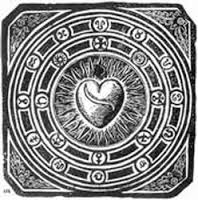Parábolas Evangélicas – Rico e Lázaro
Excerto de Adversus Marcionem Livro IV
The remarks I have advanced on this case will be also of use to me in illustrating the subsequent parable of the rich man tormented in hell, and the poor man resting in Abraham’s bosom. For this passage, so far as its letter goes, comes before us abruptly; but if we regard its sense and purport, it naturally fits in with the mention of John wickedly slain, and of Herod, who had been condemned by him for his impious marriage. It sets forth in bold outline the end of both of them, the “torments” of Herod and the “comfort” of John, that even now Herod might hear that warning: “They have there Moses and the prophets, let them hear them.” Marcion, however, violently turns the passage to another end, and decides that both the torment and the comfort are retributions of the Creator reserved in the next life for those who have obeyed the law and the prophets; whilst he defines the heavenly bosom and harbour to belong to Christ and his own god. Our answer to this is, that the Scripture itself which dazzles his sight expressly distinguishes between Abraham’s bosom, where the poor man dwells, and the infernal place of torment. “Hell” (I take it) means one thing, and “Abraham’s bosom” another. “A great gulf” is said to separate those regions, and to hinder a passage from one to the other. Besides, the rich man could not have “lifted up his eyes,” and from a distance too, except to a superior height, and from the said distance all up through the vast immensity of height and depth. It must therefore be evident to every man of intelligence who has ever heard of the Elysian fields, that there is some determinate place called Abraham’s bosom, and that it is designed for the reception of the souls of Abraham’s children, even from among the Gentiles (since he is “the father of many nations,” which must be classed amongst his family), and of the same faith as that wherewithal he himself believed God, without the yoke of the law and the sign of circumcision. This region, therefore, I call Abraham’s bosom. Although it is not in heaven, it is yet higher than hell, and is appointed to afford an interval of rest to the souls of the righteous, until the consummation of all things shall complete the resurrection of all men with the “full recompense of their reward.” This consummation will then be manifested in heavenly promises, which Marcion, however, claims for his own god, just as if the Creator had never announced them. Amos, however, tells us of “those stories towards heaven” which Christ “builds” — of course for His people. There also is that everlasting abode of which Isaiah asks, “Who shall declare unto you the eternal place, but He (that is, of course, Christ) who walketh in righteousness, speaketh of the straight path, hateth injustice and iniquity? ” Now, although this everlasting abode is promised, and the ascending stories (or steps) to heaven are built by the Creator, who further promises that the seed of Abraham shall be even as the stars of heaven, by virtue certainly of the heavenly promise, why may it not be possible, without any injury to that promise, that by Abraham’s bosom is meant some temporary receptacle of faithful souls, wherein is even now delineated an image of the future, and where is given some foresight of the glory of both judgments? If so, you have here, O heretics, during your present lifetime, a warning that Moses and the prophets declare one only God, the Creator, and His only Christ, and how that both awards of everlasting punishment and eternal salvation rest with Him, the one only God, who kills and who makes alive. Well, but the admonition, says Marcion, of our God from heaven has commanded us not to hear Moses and the prophets, but Christ; Hear Him is the command. This is true enough. For the apostles had by that time sufficiently heard Moses and the prophets, for they had followed Christ, being persuaded by Moses and the prophets. For even Peter would not have been able to say, “Thou art the Christ,” unless he had beforehand heard and believed Moses and the prophets, by whom alone Christ had been hitherto announced. Their faith, indeed, had deserved this confirmation by such a voice from heaven as should bid them hear Him, whom they had recognized as preaching peace, announcing glad tidings, promising an everlasting abode, building for them steps upwards into heaven. Down in hell, however, it was said concerning them: “They have Moses and the prophets; let them hear them!” — event hose who did not believe them or at least did not sincerely believe that after death there were punishments for the arrogance of wealth and the glory of luxury, announced indeed by Moses and the prophets, but decreed by that God, who deposes princes from their thrones, and raiseth up the poor from dunghills. Since, therefore, it is quite consistent in the Creator to pronounce different sentences in the two directions of reward and punishment, we shall have to conclude that there is here no diversity of gods, but only a difference in the actual matters before us.
